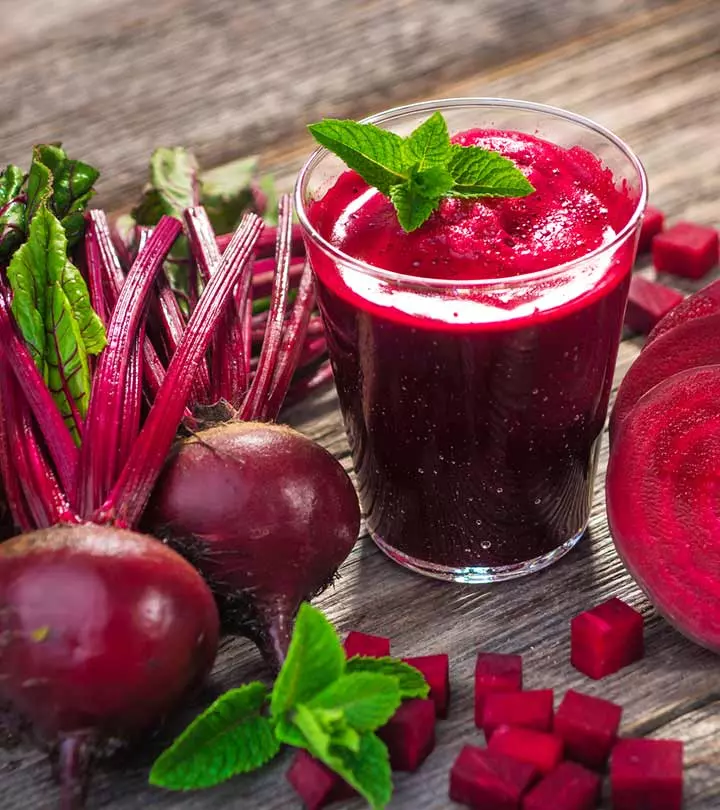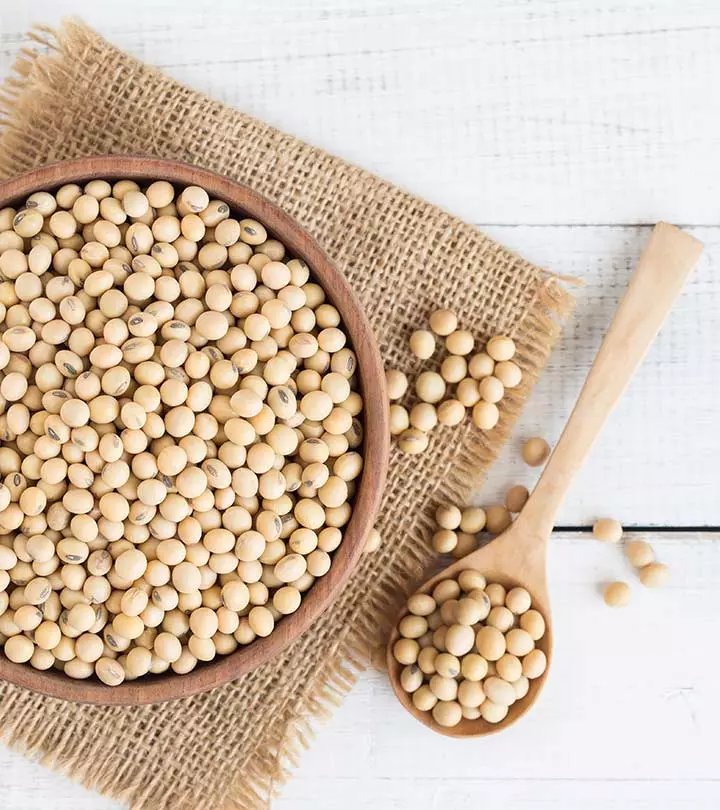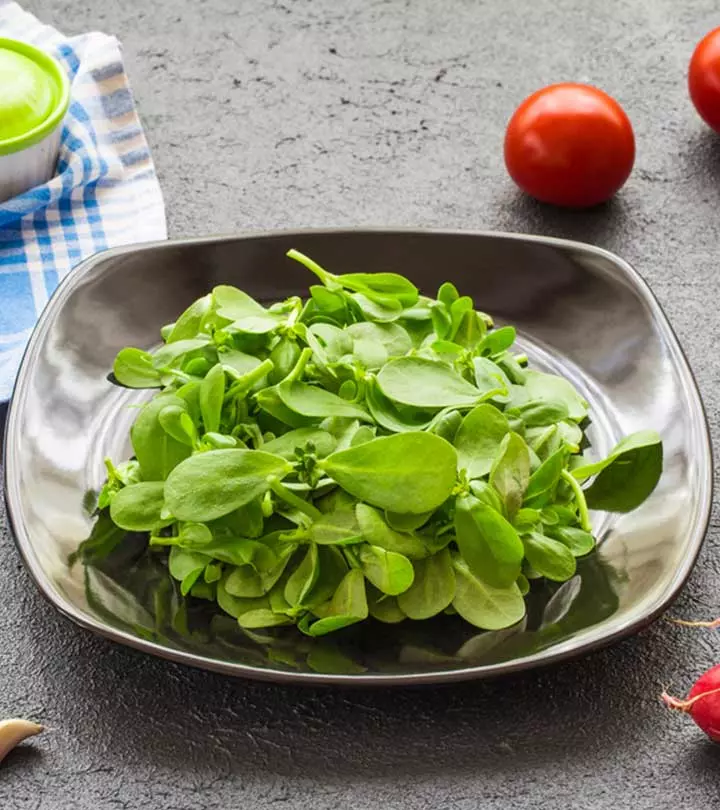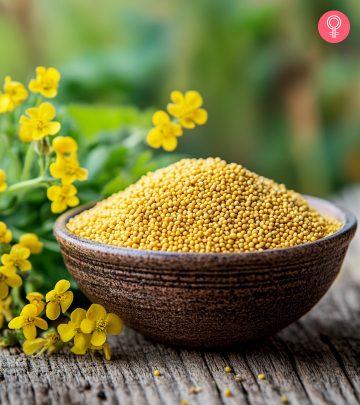Pineapple For Upset Stomach: 6 Ways To Soothe Digestion
Moderate consumption of this tropical fruit can ease the discomfort in your stomach.

Image: iStock.com
While there are many pills and antacids for digestive issues, you can help alleviate the discomfort with certain at-home treatments as well. Eating pineapple for an upset stomach is one such effective home remedy! With its anti-inflammatory properties, pineapple helps ease the cramps and pains associated with common digestive issues! Too good to believe? Read on to know how and when you should eat pineapples to help ease indigestion and calm an upset tummy!

 Know Your Ingredient: Pineapple
Know Your Ingredient: PineappleWhat Is It?
Juicy tropical fruit with spiky, tough skin and sweet insides.
What Are Its Benefits?
It can alleviate constipation and irregular bowel movements, remove toxins, and promote metabolism and health.
Who Can Use It?
People with upset stomachs can have it, it aids in digestion.
How Often?
Consume it in moderation.
Caution
Eat well-ripened pineapple only. Pregnant women and those with liver, kidney, and bleeding disorders should avoid eating pineapple.
In This Article
Pineapples – A Brief

The juicy tropical fruit contains many nutrients that help in soothing the stomach naturally when it is in distress. For instance, it is rich in enzymes that help in reducing inflammation and boosting immunity (1). Next time you have an upset stomach, get a pineapple to help ease it.
Pineapple contains bromelain, an enzyme that may help treat inflammation. This graph shows that the Caco-2 cell line was tested to see how they responded to bromelain; when the cells were exposed to specific cytokines, they showed signs of inflammation. Bromelain, when digested in the gastrointestinal tract, was a strong anti-inflammatory agent and was able to completely inhibit inflammation (IL-8 mentioned on the Y-axis) as compared to the effect of dexamethasone.

Interleukin 8 inhibition evaluation
Source: Anti-Inflammatory Effect Of BromelainKey Takeaways
- Pineapple may help in digestion, soothe the stomach, and boost the immune system as it contains enzymes.
- It may help soothe an upset stomach and ease cramps associated with digestive issues as it has anti-inflammatory properties.
- Drinking pineapple juice may manage morning sickness.
- Pregnant women and those with liver, kidney, and bleeding disorders must not consume pineapple.
Pineapples For Digestive Problems

Pineapples contain a protein-digesting enzyme, known as bromelain, which is thought to aid in digestion (2). Bromelain is extracted from the fruit or stems of pineapples. It helps in naturally breaking down proteins that are hard to digest. In Central and South America, it is used for this specific purpose.
 Trivia
TriviaPineapples have fiber which can treat constipation and irregular bowel movements (3). You can drink pineapple juice to manage morning sickness. It could be an effective remedy for intestinal worms too. And it flushes out toxins, promoting metabolism and health.
Eating Pineapples To Ease An Upset Stomach

There are many ways to consume pineapples to help you gain relief from an upset stomach.
- You can eat fresh pineapple cut into slices in between meals. Make sure that the fruit is well-ripened.
- If you have an upset stomach right after eating a meal, eat 1 cup of pineapple as dessert, and it will act as a reliever from the discomfort right away.
- Make fresh pineapple juice to drink after a meal so that you keep digestive problems away.
- If you find it difficult to eat fresh pineapple, you can always make a smoothie. Slice the fresh fruit and put the pieces into a blender with organic /greek yogurt. Your stomach will feel a whole lot better!
- You can also make a pineapple slushy that many people prefer. It is refreshing and does wonders for your stomach. All you need to do is put 1 cup of pineapple chunks into a blender with crushed ice and water. It will soothe your stomach and hydrate you.
- Eat pineapples as a healthy snack whenever you feel a little peckish. You can grill your pineapple and brush it with a little honey and pepper. It is a deliciously great way to get all those essential nutrients into your body!
As you can see, eating pineapples to help with an upset stomach is simple. No need to cook or fuss! Just remember that it is only fresh pineapple that helps keep tummy issues away and provides you with a world of goodness.
Apart from easing an upset stomach, pineapple may also provide the following benefits. Learn about them in the next section.
Other Benefits Of Pineapple
- The bromelain in pineapple has anti-inflammatory properties and may potentially soothe stomach inflammation (4).
- The enzymes in pineapple may help break down food and make it easier for the stomach to digest and absorb nutrients (5).
- Consuming pineapple or pineapple juice may alleviate constipation (6).
- The fiber in pineapple may regularize bowel movement (7).
- The dietary fiber in pineapple may act as a prebiotic and encourage the growth of beneficial gut bacteria. This is essential for boosting digestion and improving the immune system and one’s overall well-being (8).
The benefits of pineapple do not end here. Due to its anti-inflammatory properties, pineapples may also help reduce pain. Tina Sams, a blogger, recounted her experience of consuming pineapple for a few months. She said, “People often notice relief from joint pain and arthritis when taking bromelain, and that was true for me too. I also noticed another side effect in the easing of gastro-intestinal symptoms I’ve been working on through diet (i).”
Points To Remember

There are certain considerations that you should keep in mind when you eat pineapples. Eating this fruit excessively can cause problems like diarrhea, and abdominal pain (9). It is not recommended to take it if you have acidity or acid reflux. It may also cause an allergic reaction in some people. Anecdotal evidence suggests that unripe pineapples are poisonous, can irritate the throat, and have strong laxative effects. Overconsumption of pineapple may lead to fiber balls in the digestive tract, which may cause discomfort. It may also cause ulcers and trigger gastritis.
Bromelain may cause side effects on the gut intestines and other issues such as colitis, nausea, vomiting, and other gastrointestinal issues (6). It may also cause allergic reactions such as hives, rashes, and itching. People with liver, kidney and bleeding disorders should consult a doctor before ingesting bromelain. You should also avoid it during childbirth and pregnancy. Bromelain may also adversely react with other medications and supplements.
This is why you should consult your healthcare provider before using it to treat an upset stomach or any other digestive issue. Eating too much of this fruit can also lead to a sore and irritated tongue, so do not go overboard with it. This is another important reason to consult your doctor first. Although pineapple is a delicious and nutritious fruit, it’s important to be aware of all the side effects of pineapple to avoid any consequences.

Infographic: 6 Ways To Consume Pineapples To Ease An Upset Stomach
Alleviate discomfort with moderate consumption of this exotic fruit. Pineapple possesses anti-inflammatory properties to ease cramps, pain, and indigestion. Read the infographic to know how to use this fruit to ease an upset stomach.
Some thing wrong with infographic shortcode. please verify shortcode syntaxUsing pineapple for an upset stomach is an effective remedy to ease the discomfort at home. Pineapples promote digestion and immunity and also reduce inflammation. Eating well-ripened pineapples after a meal as a dessert can ease an upset stomach. You can also have pineapple juice to manage an upset stomach. However, avoid consuming pineapples in excess as they may trigger nausea, diarrhea, and other gastrointestinal issues. Pregnant women should avoid pineapples as they may negatively affect pregnancy. Caution is highly advised. However, if you are not allergic to pineapple, having it in moderation is an effective remedy to ease an upset stomach.
Frequently Asked Questions
What is the best time to eat pineapple?
It is best to eat pineapple before a meal. Have pineapples before lunch or dinner; it may help boost digestion as it has probiotic properties.
Is pineapple good for bloating?
Possibly. Pineapple is a low-FODMAP fruit, which means it can help prevent bloating (10). The fruit also contains an enzyme called bromelain that helps break down protein molecules into smaller fragments called peptides and amino acids. These fragments are absorbed more easily in the digestive system, promoting better digestion (11). This can consequently minimize bloating symptoms like gas, indigestion, and constipation.
Does pineapple cause stomach acid?
Possibly. According to anecdotal evidence, pineapple is acidic in nature which may trigger acid reflux.
Illustration: Is Pineapple Effective For Upset Stomach?

Image: Stable Diffusion/StyleCraze Design Team
Curious about the impact of pineapple on acid reflux and heartburn? Delve into this video below to unveil whether it serves as a beneficial or adverse factor for these conditions. Check it out now!
Personal Experience: Source
StyleCraze's articles are interwoven with authentic personal narratives that provide depth and resonance to our content. Below are the sources of the personal accounts referenced in this article.
i. Pineapple core – driedhttps://theessentialherbal.blogspot.com/2012/09/pineapple-core-dried.html
References
Articles on StyleCraze are backed by verified information from peer-reviewed and academic research papers, reputed organizations, research institutions, and medical associations to ensure accuracy and relevance. Read our editorial policy to learn more.
- Properties and Therapeutic Application of Bromelain: A Review
https://www.ncbi.nlm.nih.gov/pmc/articles/PMC3529416/ - Bromelain
https://www.nccih.nih.gov/health/bromelain - Pineapple consumption reduced cardiac oxidative stress and inflammation in high cholesterol diet-fed rats
https://www.ncbi.nlm.nih.gov/pmc/articles/PMC8028712/ - Bromelain: A Potent Phytomedicine
https://www.ncbi.nlm.nih.gov/pmc/articles/PMC9463608/ - Bromelain a Potential Bioactive Compound: A Comprehensive Overview from a Pharmacological Perspective
https://www.ncbi.nlm.nih.gov/pmc/articles/PMC8067380/ - Fruit bromelain ameliorates rat constipation induced by loperamide
https://www.researchgate.net/publication/319983766_Fruit_bromelain_ameliorates_rat_constipation_induced_by_loperamide - Pineapple (Ananas comosus): A comprehensive review of nutritional values, volatile compounds, health benefits, and potential food products
https://pubmed.ncbi.nlm.nih.gov/33233252/ - Fiber‐enriched botanicals: A therapeutic tool against certain metabolic ailments
https://www.ncbi.nlm.nih.gov/pmc/articles/PMC9548355/ - Systemic Allergic Reaction and Diarrhoea After Pineapple Ingestion
https://pubmed.ncbi.nlm.nih.gov/8511816/ - Low Fermentable Oligo- Di- and Mono-Saccharides and Polyols (FODMAPs) or Gluten Free Diet: What Is Best for Irritable Bowel Syndrome?
https://www.ncbi.nlm.nih.gov/pmc/articles/PMC7692077/ - Exploring the therapeutic potential of bromelain: Applications, benefits, and mechanisms
https://pmc.ncbi.nlm.nih.gov/articles/PMC11243481/
Read full bio of Shivani Sikri
Read full bio of Tanya Choudhary
Read full bio of Ravi Teja Tadimalla
Read full bio of Moksha Gandhi


























Community Experiences
Join the conversation and become a part of our empowering community! Share your stories, experiences, and insights to connect with other beauty, lifestyle, and health enthusiasts.